

“For me to give away much more information about the content of the show would detract from the fun of discovering the piece on your own. However, I will say, as someone who spends a lot of time thinking about media and digital culture, that Hampton has created an intelligent, nuanced, and wry critique of the mindlessness engendered by our collective autoamputation through digital technology. At the end, when the headphones were removed, it took us a remarkably long time to motivate ourselves into action, which speaks to what an effective experiment Rotozaza had conducted on us. Anyone looking for a unique and thoroughly enjoyable theatrical experience would be remiss not to check out GuruGuru.”
Will Fulton - NYtheatre.com - full review here
_____
** Care must be taken with description... surprises can be spoilt easily: This is meant for people WHO HAVE ALREADY EXPERIENCED GuruGuru and want to know a little more about the thinking and artists behind it... **
_____
One of the strange pleasures in performing GuruGuru is that to begin with you don't know who you are, where you are, what your motivations are or what the situation is, but that this disconcerting sense of loss is offset by conversation, relations and narrative falling into place simply by following instructions from a pre-recorded voice.
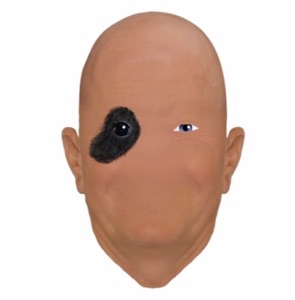
This is an advanced version of the same brain currently driving things in our world, the brain which reads your emails and offers you products accordingly, the robot on the phone in the morning calling you by your name, the device in the supermarket tracking your eyeballs as they scan the shelves. And it's all very clever. But what happens when it's wrong, or when it fails? At what point should we stop trusting?
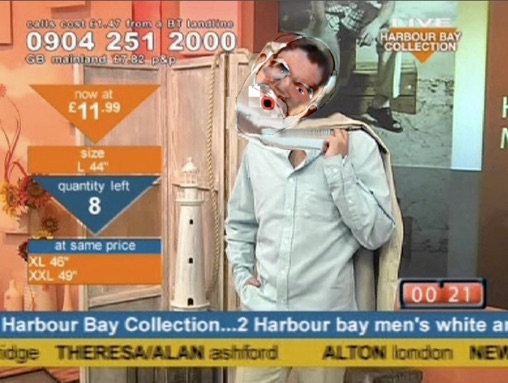
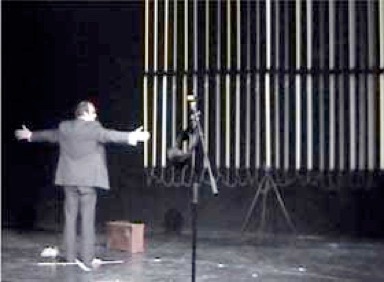
GuruGuru is the result of a long friendship between Hampton, Koyama and Khroustaliov that stretches over 20 years, and incorporates a large body of work spanning many genres - film, music, intervention, animation, architectural projects, club nights, and - with Khroustaliov (aka Sam Britton) - nine Rotozaza performances, notably BLOKE (1999, above), the experiment which began Rotozaza's deep exploration of unrehearsed performance and task / instruction based stage work.
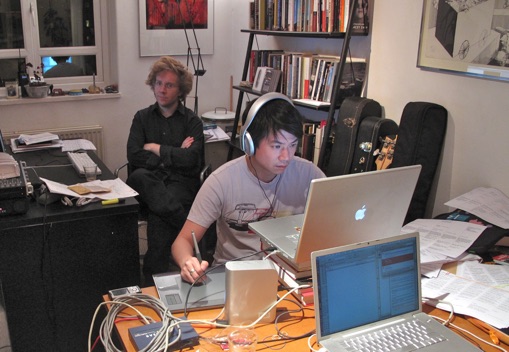
Their world is marked by a shared love for exploring systems crumbling under duress or through crisis: be they mechanical , political or belief systems, it's in the debris of their failed operations where these three artists' ideas find expression, there in the terrible gap between human aspiration and 'how things turned out'. This gap often unfolds into a potent mix of the strangely familiar with the unidentifable other; for example, the real-time electronic treatment of a banjo in Khroustaliov's 'Junkspace' (developed at IRCAM, Paris, see part of composition score below)

or, in Koyama's film 'First Place', a tiny plastic figure of Michael Schumacher in triumphant pose, arms raised, desperately negotiating his journey across an artctic landscape, the wreck of his racing car behind him.
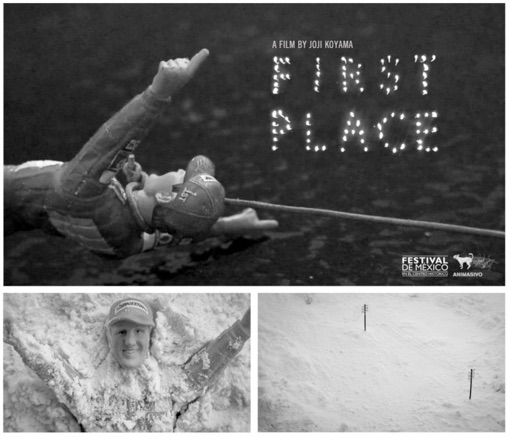
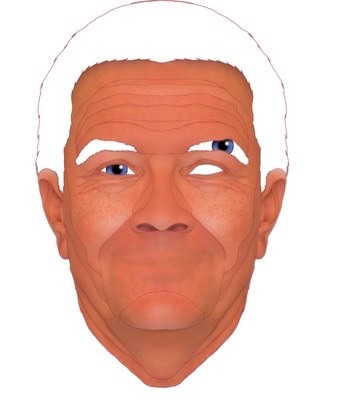
Koyama's very particular 'otherness' is certainly present in GuruGuru with the deliberately under-developed, lo-fi facial characteristics of the screened 'Guru' character. Between the silences, the glitches and the sudden outbursts, a kind of ecstatic banality develops, an invisible and uncanny void within which proceedings seem as if trapped on a see-saw between hilarity and fear. This is only exacerbated by the fusing of this character with one of Britain's most comforting voices, that of veteran BBC Radio 4 newsreader Peter Donaldson, described by the Sunday Times as "a polished and fragrant rosewood, with elegant cadences and a certain good-humoured humanity". His voice is also famous for being that of Britain’s official 'four minute warning' during the cold war, to be broadcast by air raid sirens, television and radio in event of nuclear attack.
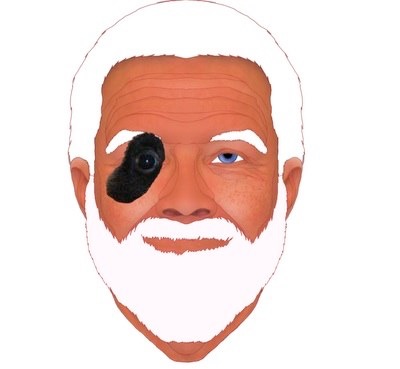
The act of piecing together a face which eventually begins to speak and address its very creators produces highly uncanny results. It also begins to reveal a reverse-history of how psychoanalysis evolved into advertising and consumer research: by means of a focus group (each participant chipping in with their 'feelings' regarding the eyes, nostrils, voice etc), you create a 'mediator' who attempts a kind of group therapy session looking at the problems each individual is experiencing.
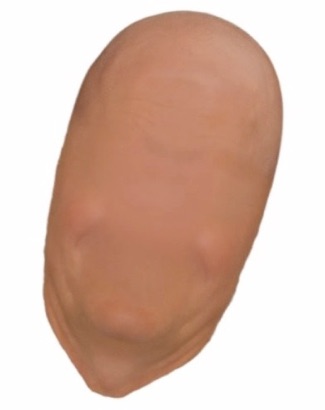
It is through Freud's notion of the uncanny that the story of modern man's relationship with the self is explored and unpeeled, revealing failed experiments, skewed intentions and, ultimately, a mindset stuck on consumer-led priorities. The piece isolates the moment when our optimism and 'good faith' in systems takes a nose-dive, where the hollow core of Freud's misappropriated ideas opens up to swallow us, and asks - to what extent do we still want to be told what to do, and are we perhaps a little addicted?
_____
Ant Hampton is a performance maker, based in London UK, working since 1998 in/as Rotozaza as well as on solo projects, collaborations, etc. He has contributed to projects by Jerome Bel, Forced Entertainment and Tim Etchells (including their recent collaboration 'True Riches' - a 'fantasy-protest' programme of live-art for the ICA. Ant continues an ongoing exploration of 'live portraiture' with Greg McLaren as 'The Other People'. In 2008 he worked as dramaturg for "Scenarios" at Manifesta7 European Biennale of Contemporary Art
guessbook.wordpress.com & theotherpeople.org
Joji Koyama - Born in 1978 in Tokyo, Joji Koyama is an award-winning filmmaker, animator and graphic artist. In 2000 he was nominated for a Becks Futures student video prize. He has since directed short films and animations, all which have been widely screened on the international festival circuit, as well as in galleries and museums. He lives and works in London.
His commercial work as Woof Wan Bau has led to a Young Guns Award for Best Animated music video and the Public Choice Award at the British Animation Awards. He has since worked with the likes of Fourtet, Coldcut, Mogwai, Matthew Herbert, The Duke Spirit and Calvin Harris.
Isambard Khroustaliov is the solo alias of Sam Britton from the electronic group Icarus. Sam trained as an architect at the Architectural Association in London, but took up music full time after securing a recording contract as an undergraduate. Since 1997 he has recorded and released music for a number of independent electronic music labels in the UK and the US (Output Recordings, Temporary Residence, Domino and The Leaf Label) to significant critical acclaim and continues to perform as Icarus (with Ollie Bown) all over Europe. In 2006 he completed a masters course in electronic music and composition at IRCAM in Paris and he is currently researching a PhD in composition at Brunel University, UK.
not-applicable.org & differance.org